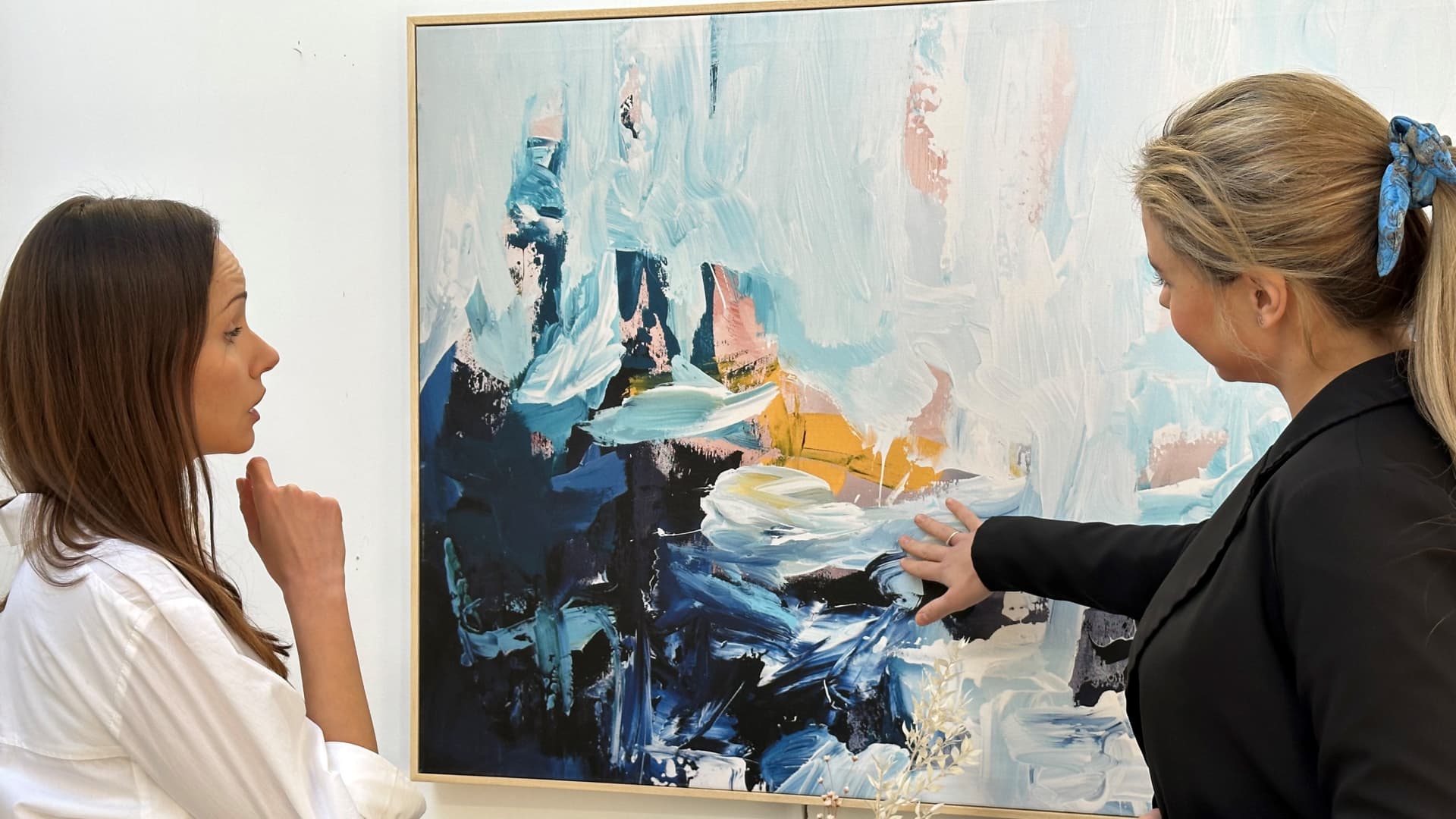Artist Omar Obaid with his wife, Summer. The pair quit corporate roles to run their art business Abstract House.
Abstract House
Omar Obaid has enjoyed painting and drawing since he was a child.
As an adult, he would wind down from work at the weekend by creating abstract art on canvas, hanging his pieces in the west London home he shares with his wife, Summer. Friends would say, “Where did you get this from? Oh, this is cool,” he told CNBC by video call.
Summer encouraged him to sell them, and they promoted his work via social media. “It was just a side thing,” to start with, he said.
Sales took off quickly and around two years later, the couple decided to quit their corporate jobs — Omar worked for The New York Times as an advertising operations executive and Summer was an ad manager for cinema chain Odeon. They hoped to turn their side hustle into a full-time e-commerce art business. They set up their company, Abstract House, in 2016, and made around £125,000 in revenue in their first year.
Working in the art world was something Summer longed for. “I always wanted to have … an art gallery. I felt like that was like a dream for me. And obviously with Omar with his paintings, it just sort of married up,” she said.
Summer, who managed clients and built relationships in her previous role, oversees trade customers, while Omar, who has a degree in computer science, focuses on making art and managing the website.
Eight years after the launch, they expect the company to make around £2 million ($2.52 million) this year. Including the couple, the business has 10 staff. And in 2020, they moved to a showroom, office and production space in west London where they could produce the artworks, store stock and pack orders for delivery.
Alongside the art — all of which is created by Omar — the firm has a printing and framing service for artists and sells individual frames as well.
Affordable art
Omar’s work sells up to £2,250 for an original, framed piece of 150 cm by 90 cm, on the Abstract House website, while small, limited edition framed prints are around £250. Trade commissions start from £4,000.
“We’ve always tried to focus on providing original affordable art … the mission was about producing quality and making it accessible,” Summer said. Originals and prints are made in-house, while prices are kept reasonable because there are no gallery fees or commission to pay.
Abstract House is seeing the cost of goods increase. “As a British manufacturer, one of our major challenges is the cost of raw materials, energy prices and shipping prices which have all risen sharply in the past three years and seem to be on an upward trend,” Summer told CNBC by email.
While the business has grown consistently, there have been hurdles, such as work being copied, which she said is a “big challenge” for artists. As for Abstract House, the issue has largely been resolved by asking those selling copycat art to remove it from sale.
An abstract painting by Omar Obaid.
Abstract House
Attracting more trade clients — around 40% of their customers are businesses — and expanding overseas are two ways the pair want to grow the business, with Omar having created six large artworks for the Caesars Forum, a conference center close to Caesars Palace hotel in Las Vegas.
Abstract House will also supply 68-story South Quay Plaza — an upscale residential building under development in London’s Canary Wharf — with more than 300 pieces of art for its communal areas.
While most of their sales are online, having a showroom is important, the couple said, so they can hold meetings with trade customers and individuals can view the work. “There are loads of people opening … side hustles online, and we wanted to show people that we are real, we exist,” Omar said.
How does their turnover compare with what they were making in their previous lives? “We are healthier than we were when we were in corporate jobs,” Summer said. “The flexibility as well, in terms of timings. I can go and pick up our children from school, we’ll be at the school gates, that’s really important,” she added.
“A lot of people tell me when I tell them the story, they say you know you’ve taken a big leap of faith,” Omar said. “I feel like because we do something genuine, that we’re really passionate about, [and] with [some] luck, it succeeded.”







